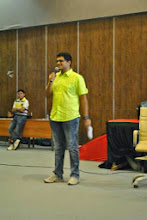Imagine meeting someone you never know, someone in deep pain and who thinks you have the remedy to his agony just because you sport a white apron and a stethoscope round your neck. And you know that all you have done to deserve this apparel is to get 50% or more marks in 1st year of MBBS, which anyone can get after mugging some books. Perhaps this was the feeling for all of us when we entered the Pediatric ward of Shardaben Hospital, our teaching hospital of that term. We were supposed to spend one month here, learning the basics of pediatrics, or the science of little children.
We were all ordered to divide the patients among ourselves for taking ‘history’, or the basic information of the patient, his/her ailment and the ODP or the Origin, Duration and Progress of the disease. We were instructed that since most of the patients would be kids, we would have to engage them in small talk to get most of information and to ensure that the kid doesn’t get bored of our constant interrogation.
I went to my patient who was playing peacefully with his mother. I gently went up to them and introduced myself and requested if they could answer a few questions. They agreed. I began with asking the name. “Ravi kumar” his mother replied. I then began asking basic questions about the symptoms as observed by the parents and the child. Within five minutes however, I had to bring the ‘small talk’ factor into play as the kid was getting irritated. I cheerfully asked, “Does Ravi go to school?” His mother brightened up at this and replied excitedly her laadla is a topper in his class. “He too wants to be like you, wear this white coat.” she said, tugging at my apron. I smiled. Indeed, I enjoyed unparalleled respect here. “Yes, auntiji, why not? One day he will surely be a brilliant doctor.” I said, sprinkling some water from the eternal spring of hope that irrigates a million dreams. My questioning ended soon. In the end, I felt I had built a great rapport. Then came the common question by any patient to any doctor, “Doctorsaab, he will get well soon?” I had no reply to this, but to console her I said cheerfully, “Sure! You’ll see, in a few days he will be playing cricket!” It brought a smile to her face which only a doctor could, even if the doctor in question is a struggling second year medico with absolutely no idea of most diseases.
We were asked to assemble in a lecture room soon for a theory lecture. The lecture ended soon and we were again asked to go back to the ward and listen to the heartbeats of an ‘interesting’ patient. It usually meant someone who displays important signs of a disease. We were supposed to remember them and it becomes easy after examining a few ‘interesting’ patients. With twenty two students surrounding him, it was difficult for me to reach to the patient. I patiently waited for everyone else to disperse. But when I went to the patient, I was shocked. It was Ravi! His breath had already turned heavy and the resident doctor, with a stern look, asked me to ‘do it fast’. I quickly put the stethoscope to his heart. The heartbeat seemed different. The two heart sounds didn’t sound together as they should, and instead, there was a strange rustling sound in between them. “Systolic murmur” said the resident doctor, “Usually a sign of mitral valve failure.”
Oh God! This child’s heart was defective and he would soon have to undergo a valve transplant operation. I knew the mother was staring at me worriedly. After all, I had only given her hope a few minutes ago. There might have been a wild questioning in her eyes, but dared not look at them, for it would burn me to ashes. More than anyone else, I dared not look into my own eyes.
Some burdens break a person. Others make one. I think I will always carry this burden on my heart, and it will always guide me to be a more understanding doctor.
Monday, June 22, 2009
Subscribe to:
Posts (Atom)
